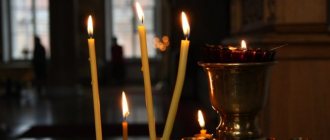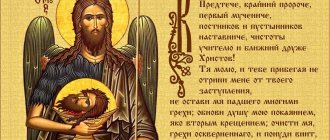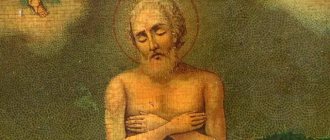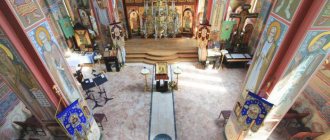The death of a person is an irreparable loss. After such a loss, the family and friends of the deceased have no choice but to light a candle for the repose of his soul and fervently pray that it does not suffer in another world.
According to the beliefs of an Orthodox Christian, lighting a funeral candle brings relief to those in whose name it is placed. Psychologists assure that it becomes easier for the person who lights the candle.
The women's website “Beautiful and Successful” addresses this article to everyone who is going to church to make a small sacrifice to God. If you don’t know how to do this correctly, do not leave the page, read it to the end.
Sacrifice to God: why do they put candles in the temple?
The custom of making a sacrifice to God dates back to ancient times, when people, fearing the wrath of higher beings and wanting to somehow appease them, tried to share their spoils with them. But how to treat a creature that does not have a materially expressed body? Probably only by turning the treat into smoke. This is what people did, burning vegetables and fruits, animals and even other people on sacrificial altars.
With the advent of the New Testament, the concept of sacrifice changed.
Christians, who began to be guided by new values and principles, began to offer God a symbolic small sacrifice - a wax candle. The main task of such a sacrifice is not to satisfy the hunger or thirst of the Lord. By buying a candle in the temple, we donate a small amount to make the house of the Lord more beautiful and better. But you don’t have to try to buy as many candles as possible to please God. One cheap candle will be enough for him. Some churches generally place special trays with free candles for people who do not have the opportunity to buy them.
Lighting a candle in front of the icon only symbolizes the Christian’s desire to join the church and the prayers of the parishioners. You need to support your request to the Lord for the repose of the soul of a loved one by reading a prayer.
The ritual of placing a candle for repose has its own rules, which follow from the general rules of conduct for a person praying in church. Therefore, any parishioner should remember the following points:
- Before entering the temple, you must cross yourself three times and make three bows from the waist.
- Upon entering the church, you must linger in the vestibule, kiss the cross located there, and, if desired, venerate the icons.
- Before you start lighting candles, you must venerate the icon on the central lectern. After this, you can turn to other icons in the temple.
- In church it is not customary to talk loudly or walk from place to place. If you need to ask people nearby about something, you can do it in a whisper.
- As a rule, men occupy the right wing of the temple, and women stand closer to the left side for prayer.
- It is forbidden to light candles for health or for repose during the reading of the Gospel, the singing of the Eucharistic Canon and the “Cherubim”: these moments of the service are especially important for every Christian; it is forbidden to miss them, being distracted by some other business, even by addressing the saints.
- Before placing a candle in a candlestick, you need to cross yourself.
Candles for health can be placed in front of any icon in the temple. But funeral candles, as the site sympaty.net found out, are usually placed in a strictly designated place.
Where and how to light a candle in church for the repose?
Usually in the left wing of any temple there is a kanun - a square or rectangular table with a holy crucifix. Candles are placed on this table in special cells or in the sand. When performing the ritual of lighting a funeral candle, you must remember the following rules:
- Before approaching the eve table with the holy crucifix, you should venerate the analogue icon: it is the main shrine in the temple.
- First they light candles for health, and after that - for repose.
- Before lighting a candle, you need to cross yourself and say in a whisper: “Lord, rest the soul of your deceased servant (name).”
- You need to light a candle from other burning candles. It is not customary to strike matches or a lighter in church.
- If there is no free cell on the eve table for a new candle, you cannot make room for it by removing someone else's burning candles. You can wait until a place is free, or simply place a candle next to the table: other believers will place it in front of the crucifix later.
- You can light a candle in a church only for the repose of a baptized person.
- It is prohibited in church to light candles for the repose of a suicide. A person who commits suicide is considered an apostate. Previously, suicides were not given funeral services or even buried in a cemetery. Nowadays, people who committed suicide while heavily intoxicated by drugs or alcohol, as well as those who suffered from mental illness, can have a funeral service in church with special permission. If the relatives of a suicidal person provide a certificate of mental illness of the deceased to the bishop, they will be able to obtain permission to perform his funeral service and to perform prayers for the repose of his soul. They will also be able to light candles for his repose.
Candles for the repose of a suicide who committed suicide in his right mind can also be lit at home. But this is allowed only to the closest relatives and with the special blessing of the priest. It is worth noting that according to church canons, people whose death occurred as a result of robbery are equated to suicide. This, of course, does not apply to victims of robbery.
If a suicide under special circumstances is allowed to light candles for repose, then it is almost never possible to pray for the repose of the soul of an unbaptized person. In this case, only an appeal to Saint War will help. He is able to put in a good word for an unbaptized person who has suffered death. For Christ, this simply does not exist, so praying for him does not give any result. But once upon a time, mothers often prayed to Saint War for their babies, whose death occurred before they could be baptized. They say that the saint has a special power that can number the deceased as a Christian.
In the ideas of people far from the church and its sacraments, there are many other prohibitions on lighting a candle for the repose. For example, some people believe that they should not be given to women during menstruation. But in fact, in our days, female uncleanness is not a reason for a ban on visiting church and lighting candles in it.
In order to light a candle for repose in church, you must also choose the right time.
Abbot Ioann Samoilov. On commemorating suicides
“Suicide is the gravest sin! The one who committed it deprived himself of repentance and all hope of salvation. The Holy Church does not make any commemoration of him, does not honor him with a funeral service and deprives him of burial in a Christian cemetery.”
Saint Ignatius Brianchaninov (14, pp. 467–468).
In connection with the increasing number of cases of unauthorized departure from the lives of people who by baptism belonged to the Orthodox Church, the urgent desire of grieving relatives for such a church farewell and with the vague ideas of modern society about the meaning of the Divine gift of life, we have made an attempt in the context of Orthodoxy to express the attitude of the Church towards a serious crime, called "suicide".
The relevance of the problem is confirmed not only by the need to explain the terrible phenomenon, but also by society’s interest in this topic. Thus, after the statement of His Holiness Patriarch Kirill at the Council of Bishops in 2011 on the introduction of a unified parish practice in relation to persons who committed suicide, many messages appeared on the Internet about the supposedly new attitude of the Russian Orthodox Church towards suicide. And secular media stated that the Church allowed their funeral service. What prompted the Primate of the Russian Orthodox Church to raise this issue? On the one hand, there is the “spiritual illness” of society, on the other, the need to solve the problem of church guidance for people who have arbitrarily ended their lives, “in order to introduce a uniform practice and avoid abuse - both in the direction of excessive severity and in the direction of unjustified indulgences.” (3, p. 13)
In our article we will try to express the view of the suicide of the holy fathers and devotees of piety, since their opinion and practical advice, based on spiritual reasoning, were recognized by their contemporaries as authoritative. Grieving relatives, guided by them, overcame despondency and found peace of mind.
First of all, we note that the patristic attitude to the problem raised was always based on the canonical rule of the Universal Church, and therefore we present its text.
“If anyone, being beside himself, raises his hands against himself or throws himself down from a height, should there be an offering (liturgical commemoration) for him or not?” - Bishop Timofey of Alexandria was asked. The saint replied: “The clergyman must judge about such things, whether he truly did this, being out of his mind. For often those close to the person who suffered from himself (that is, the relatives of the suicide), wanting to achieve that there will be an offering and prayer for him, lie untruthfully and say that he was beside himself. Perhaps he did this out of human resentment, or on some other occasion out of cowardice: and such an offering should not be made, for he is a suicide. Therefore, the clergyman must certainly test with all care, so that he does not fall under condemnation” (9, p. 486). This answer, as the 14th rule of Bishop Timothy of Alexandria, was included in the “Book of Rules” and determined the view of the Universal Church on the grave sin of suicide.
Bishop Nikodim of Dalmatia and Istria gave a detailed interpretation of this rule. He writes: “Just as the one who takes the life of another is subject to punishment, the one who takes the life of himself is also subject to punishment. And just as there are intentional and unintentional murders, so there are suicides. Intentional suicide is when someone takes his own life, in the words of this rule, “out of human resentment, or in some other case from cowardice,” and unintentional suicide is when the person is “out of mind.” He who takes his own life thereby ceases to be a living member of the Church, and therefore the Church cannot subject him to one of the punishments established for its living members. ... In this case, regarding an intentional suicide, the present rule prescribes that “it is not proper for an offering to be made,” that is, that a funeral service in the church and the Liturgy for the repose of his soul should not be performed, and, therefore, should not be buried on the consecrated cemetery. Attempted suicide is also subject to punishment, as one of the rules of Patriarch Nicephorus says, according to which the one who attempted suicide, but was unsuccessful, is subject to twelve years of penance. Regarding a suicide who took his life in a fit of madness, in an unconscious state, since he is not responsible for his actions, the Church allows the priest to pray for the repose of his soul, if, however, he is worthy of it.” (9, p. 487)
It is interesting to note that throughout the entire space of Holy Scripture there is no direct statement condemning the sin of suicide. Moreover, this grave crime, as a moral vice, is not mentioned among the many Old Testament instructions regulating the life of the chosen people. According to the Hieromartyr Philosopher Ornatsky, this is because this crime is not just a sin, but “a sin too terrible, unnatural, encroaching on the rights of God Himself, which even seemed impossible and incredible to the sacred writers.” (12, p. 3)
The fathers and teachers of the Ancient Church always treated suicide with indignation and condemnation and believed that this crime was a mortal sin for which there is no forgiveness. Thus, the Monk Isidore Pelusiot, a contemporary of St. Timothy of Alexandria, wrote: “...Whoever forcibly separates the soul from the body and surrenders himself either to strangulation or slaughter, will he be forgiven? Even after death, the ancients recognized such people as cursed and inglorious; even after cutting off the hand of a suicide, they buried it separately and far from the rest of the body, considering it indecent, as having served the murder, to give it the same honor as the rest of the body. If the hand was punished by people even after death, then will the soul that moved the hand receive any mercy? (16, p. 324)
The rule of Bishop Timothy was used at the Jubilee Council of Bishops in 2000 when discussing the problem of euthanasia in the modern church document “Fundamentals of the Social Concept of the Russian Orthodox Church”: ...The “right to die” can easily turn into a threat to the lives of patients for whose treatment there is not enough money. Thus, euthanasia is a form of murder or suicide, depending on whether the patient participates in it. In the latter case, the corresponding canonical rules apply to euthanasia, according to which intentional suicide, as well as assistance in its commission, are regarded as a grave sin. A deliberate suicide, who “did this out of human resentment, or on some other occasion out of cowardice,” is not awarded Christian burial and liturgical commemoration. If a suicide has unconsciously taken his own life “out of the mind,” that is, in a fit of mental illness, church prayer for him is permitted after the Ruling Bishop has examined the case. At the same time, it must be remembered that the guilt of a suicide is often shared by the people around him, who turned out to be incapable of effective compassion and showing mercy. Together with the Apostle Paul, the Church calls: “Bear one another’s burdens, and thus fulfill the law of Christ (Gal. 6:2)” (6, pp. 100–101).
And now let us turn to the reasoning of the holy fathers and teachers of our Church and, first of all, we will cite the thoughts of St. Philaret, Metropolitan of Moscow. He, as an outstanding hierarch, theologian, preacher, church and statesman, had a special gift and tact to express a truly Orthodox understanding of theological, general church and liturgical issues.
In one of the letters addressed to the abbot of the Holy Trinity Sergius Lavra, Rev. Anthony of Radonezh, the saint gives his reasoning about the possibility of commemorating at the proskomedia people who, according to human judgment, are “held in hell.” Apparently, we were talking about deceased great sinners who did not bring repentance to God for their sins. What is interesting for us is the saint’s opinion about prayer for people “for whom the Church did not allow either singing or sacrifice.” Suicides fall into this category.
“The Church,” wrote Saint Philaret, “teaches us to pray for the departed, without speculating whether any of them are in hell, although it is likely that there are such among those commemorated in the Church. This is good and humble, because we do not know the lot of those who have departed, we do not take on anyone the condemning thought that he is in hell, and we do not boldly ask.
In the prayers of Pentecost we have evidence that the Lord vouchsafes to accept prayerful cleansing for those held in hell. But perhaps the Church had a special thought: to relate this prayer, which contains much boldness, to a special, important day, and not leave it to every person and time.
That's what I wanted to talk about. One of the Popes, accidentally remembering the virtues of a certain pagan emperor, prayed for him; and had a revelation that his prayer was not rejected, but that he should not offer such bold prayers. I remember correctly that I read this, but I don’t remember about whom or in what book.
God is infinite in mercy, but we are commanded to know our limits.
Among those held in hell there are those about whom the Church has not allowed either singing or sacrifice. We do not lock them up in hell, but we obey the Church. And isn’t it safer to strictly adhere to the limits of this obedience?...” (10, p. 114).
Analyzing the letters of another saint, Bishop Theophan the Recluse, it is clear that he, too, repeatedly had to give answers to relatives who arbitrarily took his own life. True, in these letters we do not find anything new and outstanding. The saint strictly adheres to the canonical decrees, but, we think, it is still not superfluous to present his answers here, since they are presented by him in a remarkably simple, convincing and understandable manner for everyone. In addition, in them one can see how the wise saint, in order to pacify the troubled conscience of the questioners, tries to offer from the treasury of his heart a certain amount of Christian consolation in their sorrow.
“You ask,” he writes in one letter, “is it possible to pray for suicides? The Church doesn’t say, how will sons and daughters pray?... I sometimes think that you can pray at home in your private prayer. But here we see an attempt to prove that we are more merciful than the Church and God Himself... It is enough to confine ourselves to pitying them, consigning their fate to the immeasurable mercy of God... The idea that one can pray for those who are worthy of a church funeral is based on the assumption that those who permitted church burial did not recognize a murderer who killed himself deliberately” (4, pp. 26–27).
Elsewhere on the same issue the saint writes:
- "Horrible! Eleven years old and strangled! Wonder! What could have brought him to this? Should I remember? As a matter of love, why not remember?... Besides, what kind of intelligence does he have? God Himself, however, knows better than all of us everything that can diminish the guilt, and will forgive and have mercy if the truth does not interfere with mercy... It is safest for us to put everything into the hands of God. However, I have always thought and still think that privately, in my prayer, you can remember such people” (15, p. 538).
Carefully analyzing the answers of Saint Theophan, one can see with what caution he treated even cell (private) prayer for a suicide. Although both letters indicate consent to such a prayer, there is also a remark that in this “there is an attempt to prove that we are more merciful than the Church and God Himself.” Such caution is justified by the severity of the sin itself. By committing the mortal sin of despair, a suicide rebels against his Creator, tramples on the goodness, omnirighteousness, Providence of God and His power over human life.
Caution in prayer is also required for another reason. Prayer is not just verbal intercession for a person. When we pray for someone, we pray not only with our tongue and words, but also with our hearts. And it is with our hearts that we perceive the sorrows of our neighbor with which he was burdened, and as if on our own behalf, lifting them up to the Lord, we beg His goodness for mercy or the sending of saving grace. And the more heartfelt and sincere such a prayer is, the greater the Lord’s mercy it can bring down to the soul of the one for whom we pray. For this reason, prayer for righteous people is saving and useful for the prayer book itself.
However, it is a completely different matter when a person prays for a sinner who has committed mortal sins in life and has not thought about cleansing them through repentance. By perceiving the memory of the soul of the deceased, the one praying at the same time becomes, as it were, an accomplice of his mental state, enters the area of his spiritual yearnings, “comes into contact” with his sins and takes upon himself a share of his mental suffering. What if the soul passed into another world in a mood hostile to God and rejected the redemptive merits of the Lord, the Savior of the world? Is it easy to pray for such people? How can one allow oneself to be somewhat touched by that atheistic mood with which, for example, the soul of a suicide was infected? Doesn't this mean exposing your soul to the danger of being infected by the same mood? It is not in vain that they sometimes say that suicide is contagious: with the mere name of a suicide, his image appears in the soul, and with this image the image of the violent death of the person who committed suicide is drawn.
At the same time, how can a person who was connected with a suicide by blood ties or was very close to him in the spirit of love refrain from praying? How can you refrain from pouring out your soul before the Heavenly Father and not telling Him the sorrow of your heart? Wise, spiritually experienced elders and ascetics who possessed the gift of reasoning give answers to these questions.
Thus, the famous Optina elder Reverend Leonid (in schema Leo), gave the following instruction to his disciple Pavel Tambovtsev, who turned to him for consolation on the occasion of the news he received about the death of his father, which followed from suicide: “Commit both yourself and the fate of your parent to the will of The Lord, the wise, the almighty. Don’t experience the Most High’s miracles. Striving with humility to strengthen yourself within the limits of moderate sadness. Pray to the All-Good Creator, thereby fulfilling the duty of love and filial duties.
- But how to pray for such? - asked the novice.
- According to the spirit of the virtuous and wise, like this: “Seek, O Lord, the lost soul of my father, if it is possible, have mercy!” Your destinies are unsearchable. Do not make this my prayer a sin, but Thy holy will be done!”
“Pray simply, without testing, committing your heart to the right hand of the Most High.” Of course, it was not the will of God for such a sad death of your parent, but now it is completely in the will of the Mighty One to cast both soul and body into the fiery furnace, who both humbles and exalts, dies and gives life, brings down to hell and exalts. Moreover, He is so merciful, omnipotent and loving that the good qualities of all earthly beings are nothing before His highest goodness. For this reason, you should not be overly sad. You will say: “I love my parent, which is why I grieve inconsolably.” Fair. But God, without comparison, more than you, loved and loves him. This means that you can only leave the eternal fate of your parent to the goodness and mercy of God, who, if He deigns to have mercy, then who can resist Him? (7, pp. 181–182).
The Venerable Elder Leonid, penetrating the mystery of human grief, gave a wise answer and offered practical advice to his spiritual son, who was in deep sorrow about his suicidal father. The short prayer of the elder, without contradicting the spirit of churchliness, was a spiritual remedy capable of healing the wounds of a restless soul. The reasoning of the spirit-bearing elder, filled with edification and consolation, is also remarkable. The advice and prayer of the Monk Leonid was perceived by his contemporaries as a convenient means of consoling grieving relatives. Thus, the Monk Ambrose of Optina, answering a question from one nun, wrote:
“You also write about the unfortunate death of the brother of one of your novices and ask if it is possible to remember him. According to church rules, one should not remember him in church, but his sister and relatives can privately pray for him, as Elder Leonid allowed Pavel Tambovtsev to pray for his parent. Write out this prayer... and give it to the family of the unfortunate person. We know of many examples that the prayer conveyed by Elder Leonid calmed and consoled many, and turned out to be valid before the Lord” (13, p. 106).
This is how the godly Optina elders consoled people in deep sadness and great sorrow. Their reasoning remains relevant and vital in our time.
In the 80s last century, the author of the article had a chance to come across the “Canon of those who died without permission.” It was typed on a typewriter and belonged to the pen of the ever-memorable Metropolitan Veniamin (Fedchenkov). In the 1990s. The canon was published in a small brochure and distributed in some churches of the Russian Orthodox Church. The initiative for the publication was taken by the Pskov-Pechersky Monastery, apparently because Vladyka Benjamin found his resting place in the monastery caves. Here, in the monastery, manuscripts of the archpastor’s works are kept. The author himself speaks convincingly about the emergence of the Canon in the preface.
“In 1925, at the Sergievsky Compound in Paris - Rue de Crim, 93 - one soldier committed suicide with a gunshot. He was undoubtedly not mentally healthy... We held his funeral service...
But, embarrassed by his death on our land, I turned through one person to the Monk Nectarius of Optina with the question: “What should we do?” He replied that I should find two more people who would agree to read the funeral canon for him for 40 days, and then surrender him to the will of God.
Of course, the canon had to be read at home, and not during worship in church. That’s what the three of us did then...
Others have since contacted me about this issue. And recently they even asked to perform the funeral service for a woman who committed suicide. I refused, according to the canons (the rule of Timothy of Alexandria) and due to the internal resistance of my soul. But remembering the instructions of Father Nektary, as well as the instructions of Metropolitan Gregory of Novgorod and Petrograd, that you can pray for suicides in home prayer, but even then with a preliminary prayer for mercy for us who pray, so that we do not anger the Lord, I turned to the canon. ... But the canon written there was completely unsuitable for prayer about suicides, for it spoke of those who died “piously,” “in faith,” “in repose,” and so on. All this did not apply to free, “not mad”, suicides. Therefore, it was necessary to almost completely redo all the troparia. Maybe it will be useful to someone... And may the Lord have mercy on me for such boldness...” (5, p.1).
Analyzing the preface, one can see with what caution the author himself and his contemporaries treated the problem of suicide. The opinion of St. Nektarios of Optina is interesting. Although the suicide soldier was buried, since the act of violent death on himself was carried out “out of his mind,” the elder, even in such a “plausible” case, kept silent about the liturgical commemoration, and limited himself to the advice of reading the funeral canon for the suicide, and not to one person , but three at once. The Monk Nektarios, sharing the opinion of the Optina elders Leonid and Ambrose, also considered it possible to perform home prayer for free suicides. It can be assumed that the opinion of the Optina elders prompted Metropolitan Benjamin to the boldness of drawing up a special canon.
We allow ourselves to express our personal opinion regarding the content of the creation of the ever-memorable Lord. Having no right to deny the literary talent of Metropolitan Benjamin, as a skilled publicist and author of many books, we note that in compiling the canon he faced a difficult problem. And who can do it? In our opinion, this canon turned out to be less successful than the prayer of St. Leonidas. Vladyka Benjamin used the usual funeral refrain: “Rest, O Lord, the soul of your departed servant,” thereby equating the one who voluntarily ended his life with the Christian who died “piously.” This appeal is used in all troparions of the canon. Let us compare this appeal with the prayer of Elder Leonid: “Seek, O Lord, the lost soul of my father.” It reflects both “mercy and truth.” The prayer of the Optina Elder is brief and its content reveals simultaneously a request for pardon for a lost soul and a request for pardon for a daring request. In the canon, the first two troparions are devoted to a request for mercy for someone who begins to pray for a suicide, and the others express a plea for mercy for his lost soul, which, in our opinion, is less successful, since the idea of daring to pray for a suicide goes into the shadows. And the existence of the canon, as a kind of prayerful follow-up for a suicide, even used privately, can hardly claim its legitimacy, according to the rule of St. Timothy.
The illegality of the church use of this canon was also pointed out by His Holiness Patriarch Alexy of the 2nd century. in his report at the Council of Bishops in 1997: “Greater control is needed over the publication and introduction into use of new liturgical texts in order to avoid such misunderstandings as the publication by one Moscow parish of the theologically and canonically dubious “Canon of those who died without permission” (2, p. 26).
In the diary entries of the holy righteous John of Kronstadt, we came across two brief entries mentioning suicides. The first mentions only the name of the one who took his own life without permission: “Sick mentally suicidal, Konstantin Apollonovich Noskov, wife Lydia Nikolaevna” (11, p. 78). The second expresses the prayerful sigh of a righteous man to God for an unfortunate soul at the request of his mother: “Lord, remember in Your Kingdom the suicide Marina, born from an officer with an alcoholic father (née Ustryalova). Her mother Olga asked; her husband Vladimir” (11, p. 88).
The brief notes given above give reason to assume that the great righteous Father John of Kronstadt also allowed private prayer for suicides. We find confirmation of this in the manuscript of the Hieromartyr Seraphim (Chichagov), kept by his granddaughter V.V. Chernaya.
“Before leaving for Sarov,” writes Hieromartyr Seraphim, “I visited Fr. John of Kronstadt, who, handing me five rubles, said:
“They sent me five rubles and asked me to privately pray for a suicide: maybe you will meet some needy priest who would agree to pray for the unfortunate man.
Arriving at the nuns, I read a note in front of the blind man, in which I enclosed five rubles given to me by Fr. John. In addition, I mentioned the name of my late mother and asked to pray for her. In response I heard:
- Come back for an answer in three days.
When I arrived at the appointed time, I received the answer:
“I had your mother, she was so small, small, and an angel came with her.”
I remembered that my younger sister died when she was three years old.
“But the other man for whom I prayed, he’s so huge, but he’s afraid of me, he keeps running away.” Oh, look, isn't he suicidal?
I had to admit that he was really suicidal and told me about his conversation with Fr. John" (17, p. 349).
The above hagiographical passage contains a warning that cell prayer for a suicide is not safe for the prayer book and requires special caution.
We consider it useful and appropriate in this article to present the reasoning of the deceased confessor and resident of the Pskov-Pechersk Dormition Monastery, Archimandrite John (Krestyankin). Father John lived a difficult life. The trials that God's Providence sent him could not break his true faith, which is why the Lord gave him a special gift of reasoning. In the epistolary heritage of this elder there are several answers to the relatives of people who arbitrarily ended their lives. To illustrate, here is the text of two of his letters:
“Dear in the Lord A.! You cannot remember and pray for your mother in church, because there are canons that cannot be obeyed.
Disobedience will entail terrible consequences for the disobedient. He will give himself over to the power of the enemy. But what is possible is what Vladyka Benjamin writes about. And we send you the “Canon about someone who died without permission.” Read this canon at home for 40 days every day, and read Lev Optinsky’s prayer about your mother all your life.
Also give alms for your mother to those in need. Nothing more can be done. Even if someone gives you permission to pray in church, it will be to the detriment of both your mother and you, because no one can cancel the canons of the Church. And obedience to them will bend the Lord to mercy on you and your mother. God bless you"! (8, p. 219).
And here's another one:
“Servant of God V.! You cannot violate church canons with impunity. You cannot pray for your brother in church. You were fussing about his funeral service in vain, now at least stop collecting the wrath of God on your head. You can only pray for suicides at home, and you cannot pray for them in church, either at the Liturgy or at the memorial service. The Lord is their Judge, and you suffer for disobedience” (8, p. 220).
As can be seen, in the above responses a warning to relatives about the inadmissibility of liturgical commemoration of suicides sounds quite clearly and categorically. But at the same time, Father John allowed it to be possible to pray for them at home and advised relatives to give alms to those in need. He recommended reading the prayer of the Venerable Elder Leonid, in the schema of Leo, to the relatives of the suicide throughout their lives.
In our article we presented the thoughts and reasoning about the suicide of some holy fathers and devotees of piety. Although in the life of the Church there has never been a conciliar opinion on the advisability of prayerful cell commemoration of the souls of suicides, patristic advice, based on spiritual reasoning, was given to grieving relatives for the sake of leniency, so that they could “strengthen themselves within the limits of moderate sadness.” It should be borne in mind that patristic advice on cell prayer was given to a specific person and as a blessing to accomplish this feat. Therefore, anyone who wishes to use these tips must first ask for the blessing of a priest and at the same time know that he will be subject to spiritual warfare.
The topic raised is relevant and topical. The lack of uniformity in pastoral practice in the spiritual care of the flock of our Church in modern life has required a more in-depth study of the problem of modern suicide. Therefore, the members of the Synodal Liturgical Commission compiled the “Rite of prayerful consolation of relatives who died without permission.” This order was approved by His Holiness Patriarch Kirill, who imposed the following resolution on the report of the Chairman of the Synodal Commission: “14.VI.2011. To the Reverend Archbishop Alexy: Thank you, Vladyka, for the text presented. I hope, with God’s cooperation, by the resolution of the Holy Synod, we will complete many years of attempts to resolve the existing pastoral problem with the hope of God’s mercy for those who have gravely sinned and for the salvation of the souls of their grieving relatives.”
The “Rite of Consolation” was approved at a meeting of the Holy Synod on July 27, 2011 and now began to gradually enter the liturgical life of our Church.
It should be noted that this prayer-word is not a funeral service for suicides; it does not mention the name of the suicide, but it contains prayers of a repentant nature that can console grieving relatives who may be guilty of the unauthorized death of a person close to their hearts. The rite, if necessary, can be performed several times and involves the church prayer of the clergyman and grieving relatives for their consolation.
In addition to performing the proposed rite, relatives and friends can take upon themselves, with the blessing of the priest, the private reading of the prayer of the Venerable Elder Leo of Optina. Most of all, such dead people can be helped by the distribution of alms to those in need and the pious life of their relatives and friends themselves.
Abbot Ioann (Samoilov)
Sources and literature
- New Testament of our Lord Jesus Christ. Holy Trinity Lavra of St. Sergius, 1996.
- Bishops' Council of the Russian Orthodox Church February 18-23, 1997. Collection of documents. Publishing house of the Moscow Patriarchate, 1997.
- Report of Patriarch Kirill of Moscow and All Rus' at the Council of Bishops of the Russian Orthodox Church on February 2, 2011.
- Soulful reading. M., 1895. T. 3.
- The canon about the unauthorized belly of those who died. Pskovo-Pechersky leaflet No. 14. Publication of the Holy Dormition Pskovo-Pechersky Monastery, 1993.
- Fundamentals of the social concept of the Russian Orthodox Church. M., 2001.
- The first great elder of Optina, hieromonk Leonid, in the schema of Leo. Ed. 2. Shamordino, 1917.
- Letters of Archimandrite John (Krestyankin). Holy Dormition Pskovo-Pechersky Monastery, 2006.
- Rules of the Orthodox Church with interpretations of Nicodemus, Bishop of Dalmatia-Istria. T. 2. International Publishing Center of Orthodox Literature, 1994.
- Saint Philaret, Metropolitan of Moscow. Letters to St. Anthony, Vicar of the Holy Trinity Sergius Lavra 1831–1867. Part 1. STSL, 2007.
- Holy Righteous John of Kronstadt. Death diary. 1908. May—November. M.-SPb., 2003.
- Hieromartyr Philosopher of Ornatsky. About suicide before the court of Revealed teaching. St. Petersburg, 1894.
- Collection of letters of the Optina Elder Hieroschemamonk Ambrose to the monastics. Vol. 2. Sergiev Posad, 1909.
- Works of Bishop Ignatius Brianchaninov. Ascetic sermon. 3rd ed. T. 4. St. Petersburg, 1905.
- Tambov Diocesan Gazette, No. 20.
- Works of Saint Isidore Pelusiot. Letters. Part 3. M., 1860.
- Pleasant of God Seraphim. T. 1. Spaso-Preobrazhensky Valaam Monastery, 1993.









